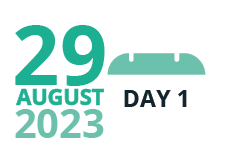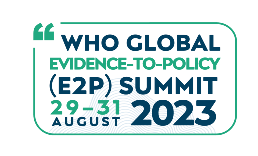Evidence-informed decision-making is essential for improving the health and well-being of populations. Launched in 2021 at the WHO E2P Summit, the Evidence-informed Policy Network (EVIPNet) Call for Action has paved the way for systematic and improved evidence-informed health policy-making, resulting in global health becoming more resilient, equitable and sustainable. The EVIPNet Call for Action has been implemented in alignment with recommendations from Cochrane Convenes for producing evidence syntheses that respond to future global health emergencies, and those of the Global Commission on Evidence to Address Societal Challenges.
In this session, we will discuss current strategies and the most recent insights on better promoting the use of evidence in policy and practice. It will delve into the main efforts undertaken by WHO EVIPNet and its partners to implement the Call, highlighting key achievements, challenges, and lessons learned.
Related documentation
Key questions and session highlights
- What are the recent global activities implementing the EVIPNet Call for Action since the WHO E2P Summit in 2021?
- How does the Call relate to international recommendations of E2P, such as Cochrane Convenes and the Global Commission on Evidence to Address Societal Challenges?
- What lessons were learned during these two years, and how will they inform EVIPNet’s next steps?
Following a plenary presentation, this session will have break-out rooms for Summit participants to share recent regional and country-level activities implemented to advance the EVIPNet Call for Action, and other good practices in evidence-informed health policy-making.
![]()
Interactive session
Promoting evidence uptake at the country level: pathways for implementing EVIPNet's Call for Action
This interactive session will provide an opportunity to take stock of recent regional and country-level activities implemented to advance the EVIPNet Call for Action, and other good practices in evidence-informed health policy-making. Participants will share the actions that have already been implemented or are currently being implemented, thereby shedding light on the progress made and highlighting successful initiatives. The session will further enable them to discuss actions they would like to see implemented based on the EVIPNet Call for Action, both at country and regional levels.
The insights from the session will be captured using digital interactive whiteboards to allow the collection of a rich and diverse body of knowledge on evidence-informed policy-making.
Key questions and session highlights
- Which key-action from the Call for Action are participants most engaged with? Which key-action from the Call for Action do participants need support to explore?



